KDDX
(Korea Destroyer Next Generation)
Defense
Naval Combat System
Naval Combat System
We have a solid track record in combat system area, built over the past 30 years by delivering numerous combat systems for more than 80 ships ranging from destroyer, frigate, fast attack craft to submarine, etc.
As the central nerve system of naval vessels, combat system detects incoming threats approaching simultaneously by using on-board sensors, performs analysis and gives commands to weapons systems like naval guns in order to remove the threats.
- Features
-
- Open-structure,
modular design to support
Scalability and
Reusability - Ergonomics design
to improve
Ease of Use - Integration and Control of
Combat Systems’ Resources
(CMS-Sensor·Weapons
Systems Interface
Analysis)


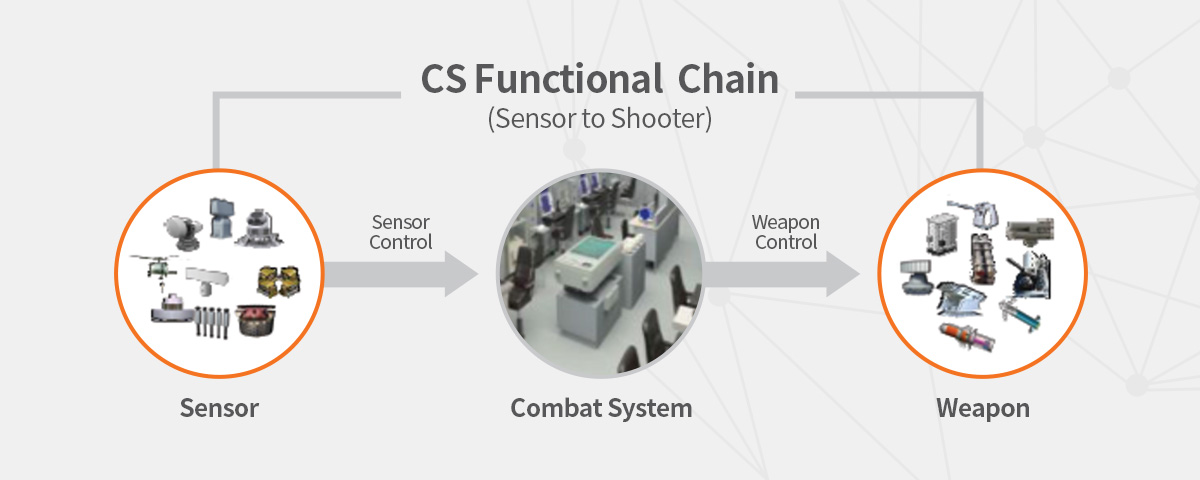

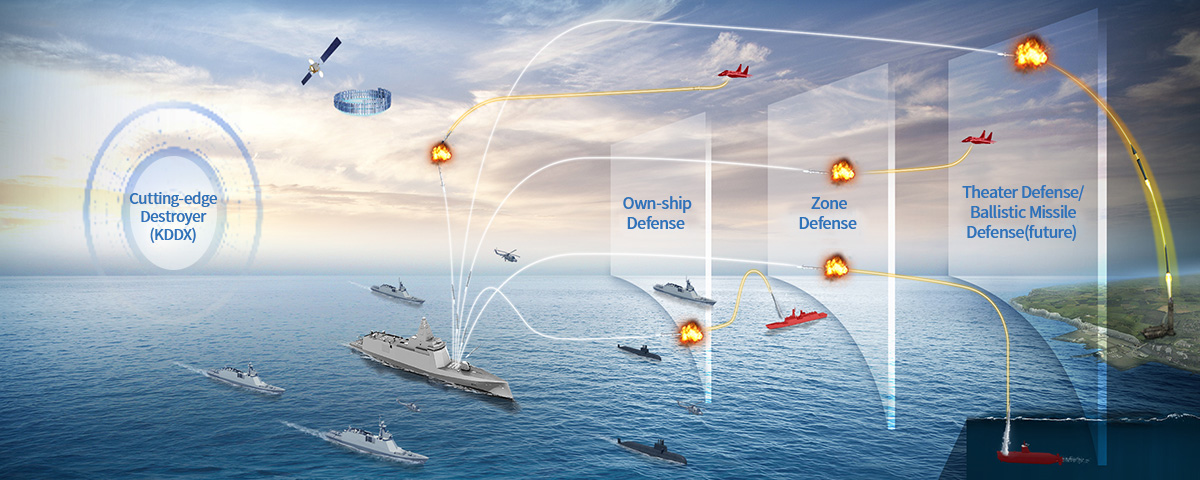

PRODUCTS
-
KDDX(Korea Destroyer Next Generation)
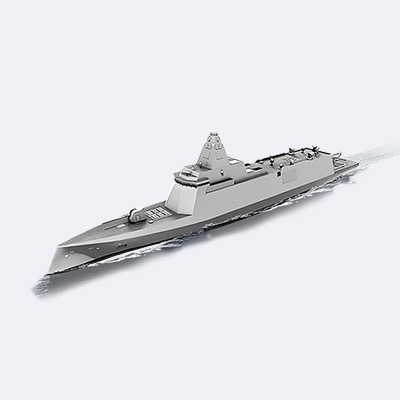
 KDDX combat system using I-MAST, which integrates radar and communication devices and antenna into one single system in order to improve the survivability of naval vessels.
KDDX combat system using I-MAST, which integrates radar and communication devices and antenna into one single system in order to improve the survivability of naval vessels.
Sensors and weapons systems mounted on a naval vessel are integrated to support tactical situations assessment, provision of information feeds required for combat commanding decisions, weapons allocations, mission engagements by each component’s operations (anti-air, anti-ballistic missile, anti-ship, anti-ground force, EW, etc.) -
FFX Batch-III
Read more
(Frigate eXperimental Batch-III)FFX Batch-III (Frigate eXperimental Batch-III)
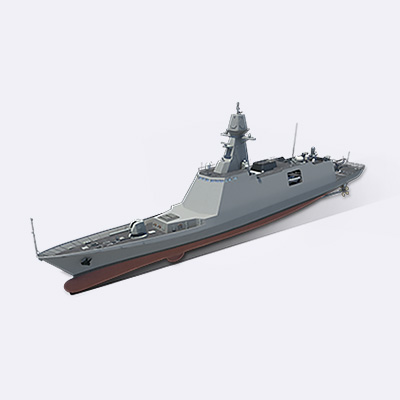
 Hanwha Systems’ Synthetic Sensor Mast was Korea’s first synthetic sensor mast development. Synthetic Sensor Mast combines Combat Management System with the sensors including 4-sided hull-fixed phased array MFR(Multi-Function Radar) and IRST(Infrared Search and Track.)
Hanwha Systems’ Synthetic Sensor Mast was Korea’s first synthetic sensor mast development. Synthetic Sensor Mast combines Combat Management System with the sensors including 4-sided hull-fixed phased array MFR(Multi-Function Radar) and IRST(Infrared Search and Track.)
Under multiple simultaneous situations, FFX Combat System can integrate and process the information collected from own-ship sensors as well as from external sources in order to use the information for the naval vessel’s command & control and weapons control.
FFX Batch III combat system is the Navy’s most up-to-date combat system of which the architecture is based on virtualization technology, high computing power integration system design technology and real time middleware with its security features reinforced. Read more -
PN-FFG
Read more
(The Philippine Frigate)PN-FFG (The Philippine Frigate)

 PN-FFG Combat System was developed for the export purpose, based on the field proven FFX Batch II Combat System. Being mounted on the Jose Rizal-Class Frigate of the Philippine Navy, this combat system provides for the integration of various sensors including own-ship sensors, weapons sensors with tactical data links. It is also capable of performing ant-ship, anti-submarine and electronic warfare operations.
PN-FFG Combat System was developed for the export purpose, based on the field proven FFX Batch II Combat System. Being mounted on the Jose Rizal-Class Frigate of the Philippine Navy, this combat system provides for the integration of various sensors including own-ship sensors, weapons sensors with tactical data links. It is also capable of performing ant-ship, anti-submarine and electronic warfare operations.- Features
-
- Baseline 2 applied.
- Standards combat system architecture
- COE(Common Operating Environment) applied
- NOA based open structure, modular design
- Integration with tactical datalinks
-
KSS-III
Read more
(Korean Submarine-III)KSS-III (Korean Submarine-III)
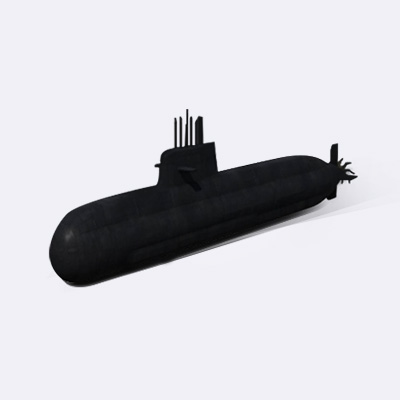
 KSS-III Combat System will be mounted on ROK Navy’s Jang Bogo-class Submarine.
KSS-III Combat System will be mounted on ROK Navy’s Jang Bogo-class Submarine.
It is interfaced with underwater acoustic sensor, optical mast sensors as well as with weapons systems including torpedoes, mines, guided missiles, etc., in order to perform submarine missions such as target surveillance and tracking, weapons assignment and engagement, etc. -
KDX-III Batch-II
Read more
(Korea Destroyer eXperimental-III Batch-II)KDX-III Batch-II (Korea Destroyer eXperimental-III Batch-II)
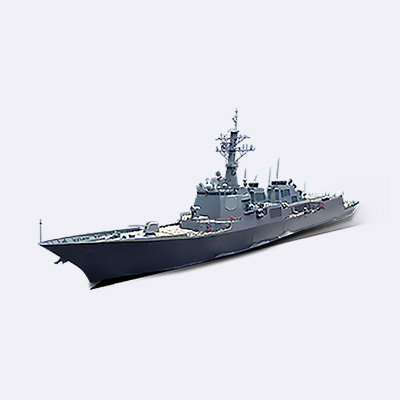
 KDX-III B2 applies the Aegis Integrated Combat System, which is capable of simultaneously undertaking anti-air, anti-ship and anti-surface warfare.
KDX-III B2 applies the Aegis Integrated Combat System, which is capable of simultaneously undertaking anti-air, anti-ship and anti-surface warfare.
It is connected with various sensors including SPY-1D search and tracking radar, the EOTS (Electro-Optical Targeting System) and the electronic warfare devices as well as weapons systems including 5-inch naval gun, anti-air, anti-ship, and anti-surface missiles and torpedoes and the close-in weapon systems in order to perform effective engagements thru target surveillance, tracking and threat assessment.- Features
-
- NOA based open architecture, modular design software is applied to the Aegis combat system.
- KIF: Development of interfaces between the Aegis Combat System and other naval systems
- K-GCS : Applied Korea’s local design technologies to the Aegis Combat System for gun firing control.
-
KDX-I PIP
Read more
(Korea Destroyer eXperimental-I Performance Improvement Combat System)KDX-I PIP (Korea Destroyer eXperimental-I
Performance Improvement Combat System)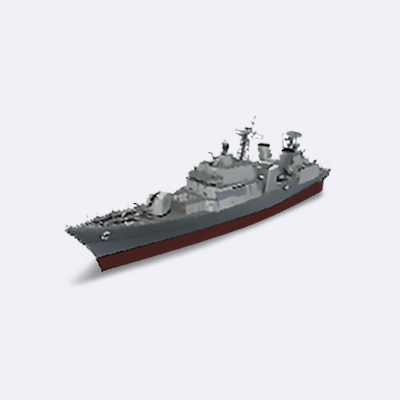
 KDX-I PIP is intended to replace the existing KDX-I combat system with the most up-to-date, locally developed combat system.
KDX-I PIP is intended to replace the existing KDX-I combat system with the most up-to-date, locally developed combat system.
Link-16(NATO Digital Tactical Datalink) is installed on KDX-I PIP Combat System, which enables joint or combined forces to share their information and have theater tactical situation awareness. Therefore, under multiple simultaneous combat situations, the combat system can process the information collected from own-ship surveillance sensors and from other sensors all together, in support of commanding decisions and weapons control.- Features
-
- Baseline 2 applied
- Standard combat system architecture
- COE(Common Operating Environment) applied
- NOA based open structure, modular design
-
MY-TRV
Read more
(Malaysia Training Vessel)MY-TRV (Malaysia Training Vessel)
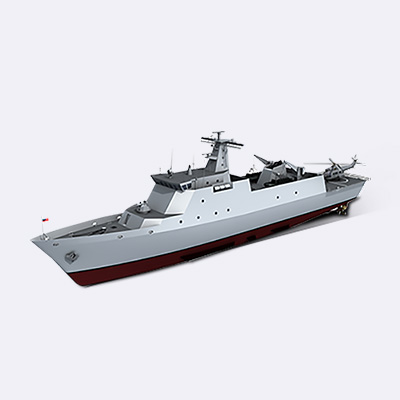
 MY-TRV Combat System is the export purpose combat system developed with Korea’s local technologies. This system is linked with EOTS (Electro-Optical Targeting System) and weapons systems like 30 mm naval guns, etc., for anti-air and anti-submarine operations. Thru target surveillance, tracking, threat assessment, weapons control, the combat system supports commanding decisions, engagement operations and on-board trainings
MY-TRV Combat System is the export purpose combat system developed with Korea’s local technologies. This system is linked with EOTS (Electro-Optical Targeting System) and weapons systems like 30 mm naval guns, etc., for anti-air and anti-submarine operations. Thru target surveillance, tracking, threat assessment, weapons control, the combat system supports commanding decisions, engagement operations and on-board trainings- Features
-
- Baseline 2 applied
- Standard combat system architecture
- COE(Common Operating Environment) applied
- NOA based open structure, modular design
- Interface with EOTS and 30mm naval guns
-
FFX Batch-II
Read more
(Frigate eXperimental Batch-II)FFX Batch-II (Frigate eXperimental Batch-II)
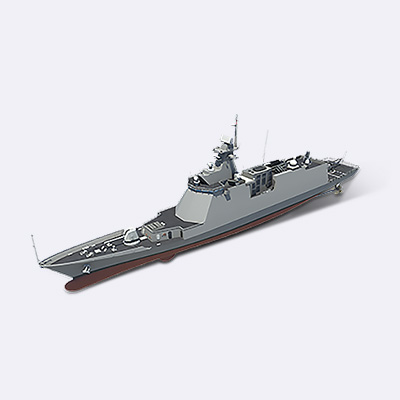
 FFX is a new frigate to replace patrol boats like FF(Frigate) and PCC(Patrol Combat Corvette) currently in operation.
FFX is a new frigate to replace patrol boats like FF(Frigate) and PCC(Patrol Combat Corvette) currently in operation.
Under multiple simultaneous combat situations, FFX Combat System can support anti-air, anti-ship, anti-submarine and electronic warfare operations simultaneously.- Features
-
- Baseline 2 applied
- Standard combat system architecture
- COE(Common Operating Environment) applied
- NOA based open structure, modular design
-
PKMR
Read more
(Patrol Killer Medium Rocket)PKMR (Patrol Killer Medium Rocket)
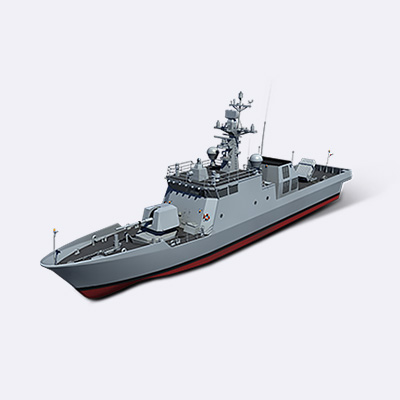
 PKMR is the next generation patrol boat to replace PKM(Patrol Killer Medium) currently being deployed. Under multiple simultaneous combat situations, PKMR Combat System is capable of processing all the collected target information to support commanding decisions and weapons controls. It also assists combat commands and weapons controls for both fleet level or single ship combat missions. Also, in consideration of the boat’s small-sized features, the combat system is designed as a light-weight and small-sized unit, making it easier to install and maintain the system in a narrow and confined operation environment.
PKMR is the next generation patrol boat to replace PKM(Patrol Killer Medium) currently being deployed. Under multiple simultaneous combat situations, PKMR Combat System is capable of processing all the collected target information to support commanding decisions and weapons controls. It also assists combat commands and weapons controls for both fleet level or single ship combat missions. Also, in consideration of the boat’s small-sized features, the combat system is designed as a light-weight and small-sized unit, making it easier to install and maintain the system in a narrow and confined operation environment.- Features
-
- Baseline 2 applied
- Standard combat system architecture
- COE(Common Operating Environment) applied
- NOA based open structure, modular design
- Light-weight, small-sized design for easy and convenient installation and maintenance
-
MLS-II
Read more
(Mine Layer Ship-II)MLS-II (Mine Layer Ship-II)
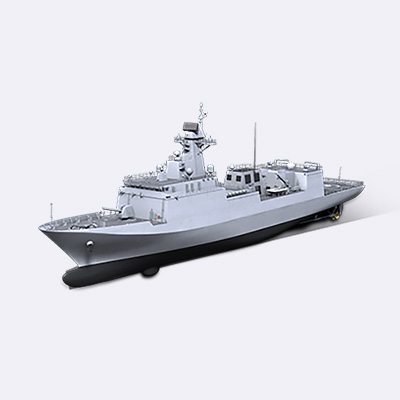
 MLS-II is the next generation mine layer ship that lays mines around the key ports to protect the ports from enemy submarines and ships. MLS-II Combat System supports anti-air, anti-ship, and anti-submarine operations and performs the commanding and support ship functions for mine counter forces. At normal times, MLS-II Combat System is utilized as a platform to support trainings on FFX-I, LST-II, MLS-II Combat Systems.
MLS-II is the next generation mine layer ship that lays mines around the key ports to protect the ports from enemy submarines and ships. MLS-II Combat System supports anti-air, anti-ship, and anti-submarine operations and performs the commanding and support ship functions for mine counter forces. At normal times, MLS-II Combat System is utilized as a platform to support trainings on FFX-I, LST-II, MLS-II Combat Systems.- Features
-
- Baseline 2 applied
- Standard combat system architecture
- COE(Common Operating Environment) applied
- NOA based open structure and modular design
-
LST-II
Read more
(Landing Ship Tank-II)LST-II (Landing Ship Tank-II)
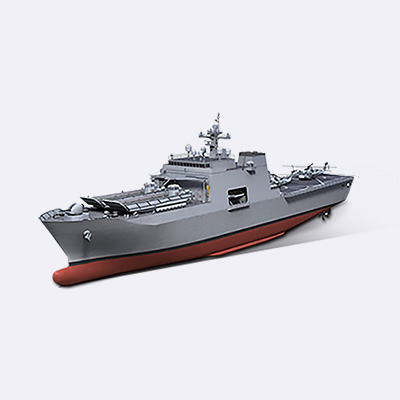
 LST-II is the next generation Land Ship, Tank that will replace the existing LST being deployed. LST-II Combat System is intended to support Marine Corps’ landing operations. It will be equipped with 3D surveillance radar, EOTS sensors to conduct anti-air, anti-submarine and Compound War. Thru its interfaces with the weapons systems including 40 mm naval gun, SAAM(Surface to Air Anti-Ship Missile) and MASS(Multi Ammunition Soft-kill System), etc., LST-II Combat System effectively performs target surveillance, tracking, threat assessment and weapons controls in support of commanding decision and combat engagement.
LST-II is the next generation Land Ship, Tank that will replace the existing LST being deployed. LST-II Combat System is intended to support Marine Corps’ landing operations. It will be equipped with 3D surveillance radar, EOTS sensors to conduct anti-air, anti-submarine and Compound War. Thru its interfaces with the weapons systems including 40 mm naval gun, SAAM(Surface to Air Anti-Ship Missile) and MASS(Multi Ammunition Soft-kill System), etc., LST-II Combat System effectively performs target surveillance, tracking, threat assessment and weapons controls in support of commanding decision and combat engagement.- Features
-
- Baseline 2 applied
- Standard combat system architecture
- COE(Common Operating Environment) applied
- NOA based open structure, modular design
- Interfaces with 3D surveillance radar, EOTS, 40 mm naval gun, SAAM(Surface to Air Anti-Ship Missile) and MASS(Multi Ammunition Soft-kill System)
-
FFX-I
Read more
(Frigate Guided missile)FFX-I (Frigate Guided missile)
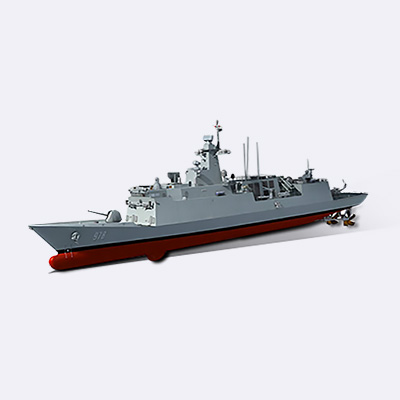
 FFX-I Ulsan-class Frigate will replace frigates and patrol boats currently in operation. FFX-I Combat System will be equipped with 3D surveillance radar, tracking radar, EOTS and ECCM sensors to perform anti-air, anti-submarine, anti-surface and Compound War operations. Also, it will be interfaced with weapons systems such as 5 inch naval gun, anti-air, anti-ship, anti-surface missiles, torpedoes and CIWS-II (Close-In Weapons System-II) to support effective operation command and successful engagement.
FFX-I Ulsan-class Frigate will replace frigates and patrol boats currently in operation. FFX-I Combat System will be equipped with 3D surveillance radar, tracking radar, EOTS and ECCM sensors to perform anti-air, anti-submarine, anti-surface and Compound War operations. Also, it will be interfaced with weapons systems such as 5 inch naval gun, anti-air, anti-ship, anti-surface missiles, torpedoes and CIWS-II (Close-In Weapons System-II) to support effective operation command and successful engagement.- Features
-
- Baseline 2 applied
- Standard combat system architecture
- COE(Common Operating Environment) applied
- NOA based open structure, modular design
- Combat system training mode is available
- Internal and external system interface analysis
-
PKG
Read more
(Patrol Killer Guided Missile Ship)PKG (Patrol Killer Guided Missile Ship)
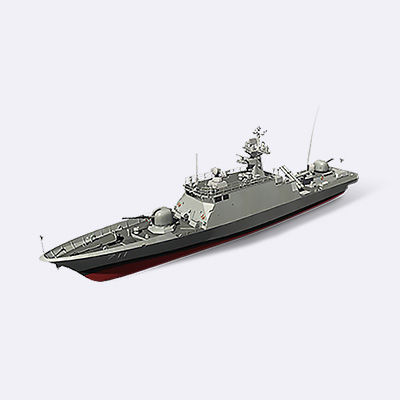
 PKG Combat System operates the ship’s command and weapons systems. The combat system is linked with sensors such as surveillance radar, tracking radar and EOTS to assist Compound War operations including naval gunfire support. Also, thru its interfaces with weapons systems including 76mm and 40mm naval guns, SSM(Surface to Surface Missile) and MASS (Multi Ammunition Soft-kill System), the combat system supports commanding decision and tactical responses.
PKG Combat System operates the ship’s command and weapons systems. The combat system is linked with sensors such as surveillance radar, tracking radar and EOTS to assist Compound War operations including naval gunfire support. Also, thru its interfaces with weapons systems including 76mm and 40mm naval guns, SSM(Surface to Surface Missile) and MASS (Multi Ammunition Soft-kill System), the combat system supports commanding decision and tactical responses.- Features
-
- Baseline 1 applied
- Korea’s first 100% local development in this category.
- High precision, advanced ballistic trajectory computation technology applied
- Interfaces with surveillance radar and tracking radar
- Combat system training mode is available
- OMG DDS applied
- Synchronized video and data recording and play function
-
LPH
Read more
(Landing Platform Helicopter)LPH (Landing Platform Helicopter)
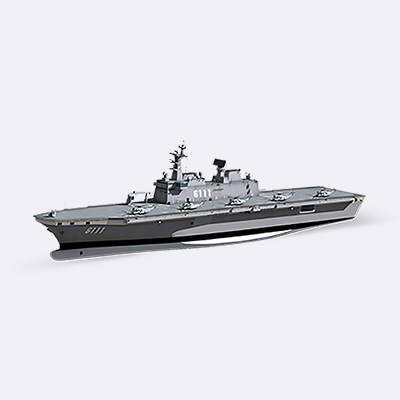
 LPH is a warfare ship used to land and support amphibious forces during combined or joint operations. As one of the Navy’s key military strength, LPH is responsible for supporting the transport and commanding of maneuvering units.
LPH is a warfare ship used to land and support amphibious forces during combined or joint operations. As one of the Navy’s key military strength, LPH is responsible for supporting the transport and commanding of maneuvering units.
LPH Combat System is comprised of CFCS(Command and Fire Control System) for own-ship defense and CSS(Command Support System) in support of maneuvering units.- Features
-
- Baseline 2 applied
- CFCS(Command and Fire Control System)+ CSS(Command Support System)
- Tactical mode and training mode can be operated simultaneously
-
DDH-II
Read more
(Destroyer Helicopter-II)DDH-II (Destroyer Helicopter-II)
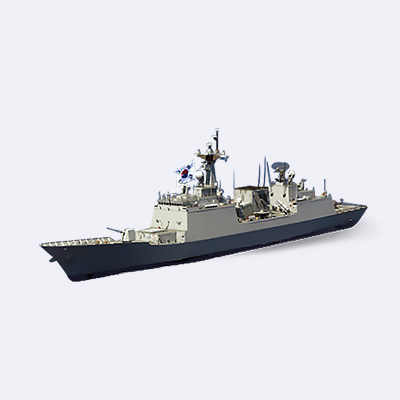
 DDH-II Combat System provides for command & control of Maritime Battle Group(subordinate ships.) Its functions include warning and attack on the air, sea, and underwater threats, sea zone air defense, naval gunfire support, landing operation plan/assault and sea transport route protection.
DDH-II Combat System provides for command & control of Maritime Battle Group(subordinate ships.) Its functions include warning and attack on the air, sea, and underwater threats, sea zone air defense, naval gunfire support, landing operation plan/assault and sea transport route protection. -
DDH-I
Read more
(Destroyer Helicopter-I)DDH-I (Destroyer Helicopter-I)
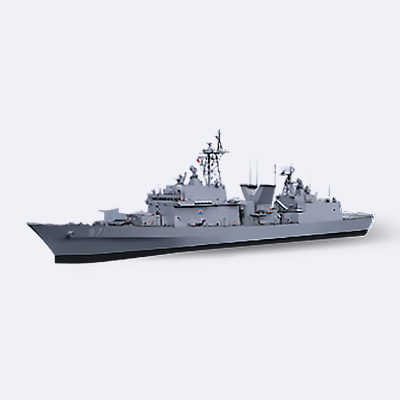
 DDH-I Combat System provides for command and control of subordinate and assigned units belonging to a regional fleet. Under the specific combat situations of each component operation, DDH-I combat system connects all the onboard sensors, weapons systems and various tactical datalinks for integrated operation, enabling the commanding officer to perform the ship’s mission operations.
DDH-I Combat System provides for command and control of subordinate and assigned units belonging to a regional fleet. Under the specific combat situations of each component operation, DDH-I combat system connects all the onboard sensors, weapons systems and various tactical datalinks for integrated operation, enabling the commanding officer to perform the ship’s mission operations. -
WSA-423
Read more
(Weapon Ship Automation-423)WSA-423 (Weapon Ship Automation-423)
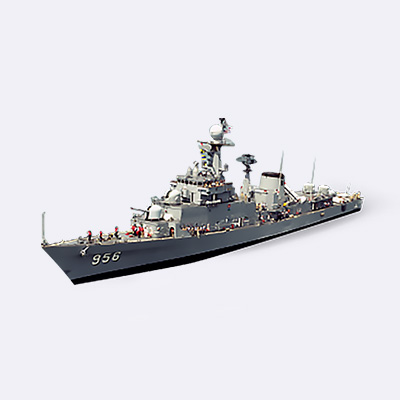
 WSA-423 is one of the key naval gun fire control systems. It consists of FCS, radar and EOTS. It is interfaced with Gyro, Log, Link-14, sonar, ESM, Harpoon, 76mm gun, 40mm gun, IFF, navigation radar and DA05 radar to perform the device controls and firing mission.
WSA-423 is one of the key naval gun fire control systems. It consists of FCS, radar and EOTS. It is interfaced with Gyro, Log, Link-14, sonar, ESM, Harpoon, 76mm gun, 40mm gun, IFF, navigation radar and DA05 radar to perform the device controls and firing mission. -
Smart DDS
Read moreSmart DDS

 OMG DDS(Data Distribution Service for Real-Time Systems) is an international standard based real-time communication middleware developed by Hanwha Systems
OMG DDS(Data Distribution Service for Real-Time Systems) is an international standard based real-time communication middleware developed by Hanwha Systems- Assuring real-time communication based on the optimum data distribution function in distributed system environment
- Confirmed to be a reliable and secure system as it has been applied to various weapons systems including combat systems
- Its quality and performances have been provided as it acquired SW accreditation (Good Software) from Telecommunications Technology Association of Korea
- Features
-
- International standard technology-based DDS to provide for high level of interoperability
- Enabling the development of light software architecture based on data-centric communications
- Responding flexibly to system configuration changes to offer a high level of scalability
- Efficient resource utilization as data transmission policy can be set up per the purpose of reception/transmission
- Supporting standard-based middleware security technology such as user authorization, access control, data encryption, etc.
Main Facilities
-
- Naval Combat Management System Test Site
-
- Large-sized test site that can accommodate combat system Integration tests
- LBTS(Land Based Test System) is available to perform naval combat system’s integration tests.
- Land based testing environment is prepared to support unit tests and Factory acceptance tests, etc.
- Dimension : 56m x 30m x 6.5m
-
- Software Test Lab
-
- Korea’s indigenous model-based naval combat system software development
- Combat system SW development/SW integration/verification tests
- M&S based combat simulation tests and effects analysis
- Core algorithm development and tests


